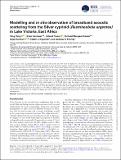Modelling and in situ observation of broadband acoustic scattering from the Silver cyprinid (Rastrineobola argentea) in Lake Victoria, East Africa
Abstract
Lake Victoria is the second-largest freshwater lake in the world, and fish from the lake are a vital food resource for millions of people living around it. The silver cyprinid (Rastrineobola argentea), a small schooling pelagic species known in Tanzania as “dagaa” contributes ca. 55% to the total annual catch (ca. 0.51 million tonnes (MT) in 2014). The acoustic target strength (TS, dB re 1 m2) of dagaa, a key factor for biomass estimation, is however not well described, and is a major source of uncertainty in biomass estimation. In this study, we developed a Kirchhoff-ray mode (KRM) model to predict the TS of dagaa at standard fisheries survey frequencies. The model was based on the morphology of the body and the dual-chambered swimbladder, as obtained from X-ray images of fish ranging in total length (TL) between 2.8 and 5.4 cm. The results suggested that the swimbladder (which comprises 2.6 to 8.2% of body volume) accounts for ca. 65 to 90% of the total backscattering at 120 kHz. The predicted TS was highly dependent on tilt angle, varying by 14.0 dB at 120 kHz across the tilt range 65–115˚ (where 0˚ is head up and 180˚ is tail up), and TS variability with tilt generally increased with increasing frequency. The tilt angle of acoustically tracked individual fish indicated a distribution of tilt angles with a mean and s.d. of 93.5 and 15.1°. Our model suggested a new tilt-averaged TS–TL relationship for dagaa [TS120 kHz=19.49log(TL)−70.3], which leads to a TS 1.5 dB higher than the value in the relationship presently used to estimate stock biomass. The new relationship will lead to a substantial reduction (by ca. 30%) in estimated biomass. The discrepancies between the mean relative frequency response of the in situ measurements of backscatter from dagaa and the KRM model predictions were in the range of -2.9–3.1 dB at frequencies from 45 to 250 kHz. The KRM modelling and in situ broadband measurements of dagaa will be beneficial for acoustic identification and behavioural studies of dagaa, and will enable improved biomass assessment, thereby underpinning sustainable long-term management.
Citation
Yang , Y , Gastauer , S , Proud , R , Mangeni-Sande , R , Everson , I , Kayanda , R J & Brierley , A S 2023 , ' Modelling and in situ observation of broadband acoustic scattering from the Silver cyprinid ( Rastrineobola argentea ) in Lake Victoria, East Africa ' , ICES Journal of Marine Science , vol. Advance article , fsad137 . https://doi.org/10.1093/icesjms/fsad137
Publication
ICES Journal of Marine Science
Status
Peer reviewed
ISSN
1054-3139Type
Journal article
Description
Funding: YY was funded by the China Scholarship Council. This work was supported by a grant from the UK Royal Society under the “International Collaboration” theme to ASB and RJK.Collections
Items in the St Andrews Research Repository are protected by copyright, with all rights reserved, unless otherwise indicated.

